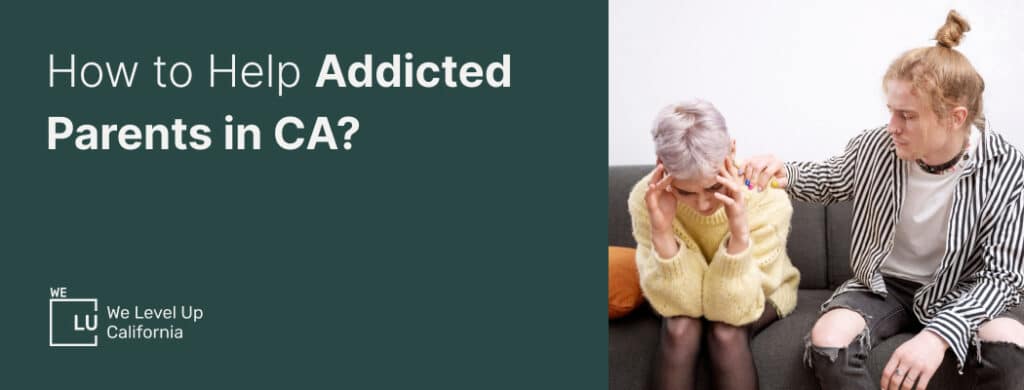Traditionally, parents are your source of strength and support. They are here to guide you through challenges with wisdom and love. Yet, there comes a time when these roles may reverse, and it’s your parent who needs your strength and support. Facing a parent’s addiction is one of these times. It is a moment filled with uncertainty. It is a time when profound care and connection are very important. We understand you and, as one of the best rehab centers in California, are here to help in this reversal of roles. Stick around as we give you actionable tips to help your addicted parents heal and get their lives back together!
Skip To:
The prevalence of SUDs in California
Unfortunately, substance use disorder affects many Californians. As per California Health Care Foundation stats from 2018-2019, 8.8% of the population faced challenges with substance use. Keep in mind that this percentage amounts to approximately 2,915,000 people! This is a huge number, and it is a significant burden on the state as is.
When speaking about specific substances, alcohol was to blame for most addictions back at the time. In fact, 2,079,000 people struggled with alcohol use during this period. Even though it is socially acceptable and not illegal, drinking alcohol carries many risks. It poses health risks, in addition to addiction risks, and could even lead to alcohol psychosis if abused for a prolonged period.
Illicit drugs were also very popular, with 1,079,000 people using them. Other substances include pain medication. Nearly 192,000 Californians had difficulties related to pain medication misuse, according to the same 2018-2019 survey.

Can addicts be good parents?
Having addicts as parents is not easy. But can addicts be good parents? This is a tough question to answer, as what may be ”good” for one may not be ”good” for another. Nevertheless, if you have a case of parents addicted to drugs or alcohol, both of you will certainly face challenges, including:
- Emotional and psychological effects
- Changes in family roles and responsibilities
- Effects on relationships
Emotional and psychological effects on you
Seeing your addicted parents battle with addiction may emotionally drain you. You might feel a mix of confusion, anger, sadness, or fear. It is only natural to feel this way since addiction makes your situation at home unstable and uncertain. It is common to feel anxious or depressed as you try to cope with everything that’s happening.
You might even start feeling isolated or believe that no one can possibly understand what you’re going through. However, that’s not at all true! Many people in similar situations share your feelings and struggles. Counseling can provide solace and understanding and help you realize you are not alone.
Changes in family roles and responsibilities
When your parents are addicted, you’ll likely notice that your family dynamics are beginning to shift. All of a sudden, you’ll find yourself taking on additional responsibilities that traditionally fall to your parents. This might include managing household finances, grocery shopping, or even caring for younger siblings, as drug addiction parenting is certainly not the type of parenting children should be exposed to.
You’ll also assume the role of a caregiver of your parent, a reversal that is as emotionally challenging as it is practically. This shift in roles can place a heavy burden on you. It might affect your work, personal life, and mental health.
Get Help. Get Better. Get Your Life Back.
Searching for an Accredited Drug and Alcohol Rehab Centers in Near You?
Even if you have failed previously and relapsed, or are in the middle of a difficult crisis, we stand ready to support you. Our trusted behavioral health specialists will not give up on you. When you feel ready or just want someone to speak to about therapy alternatives to change your life call us. Even if we cannot assist you, we will lead you to wherever you can get support. There is no obligation. Call our hotline today.
FREE Addiction Hotline – Call 24/7Effects on relationships
Believe it or not, living and caring for parents addicted to drugs could even affect your social life and relationships with peers. It’s possible you’ll be embarrassed about your family situation and even fear judgment. In turn, you may start feeling hesitant to engage in social activities or invite friends to your home. This isolation could make it hard to form and maintain meaningful friendships.
Also, the stigma associated with addiction further complicates social interactions. Misunderstandings about addiction can lead to criticism from others. This could make you feel more lonely and make an already challenging situation feel all the more isolating.
Signs you are dealing with parents addicted to drugs
To help your addicted parents, first, you need to be able to recognize signs that suggest they are dealing with a substance abuse disorder. Here are key signs to watch out for:
- Significant changes in mood, energy levels, and interest in hobbies or activities they once enjoyed. These may be sudden or gradual.
- Noticeable neglect of personal or professional responsibilities. This could include missing work and/or forgetting about appointments.
- Lack of interest in attending family events, social activities, or nurturing the friendships they previously valued.
- Unexplained financial problems, such as borrowing money, sudden debts, or spending money excessively.
- Apparent changes in appearance, such as weight loss, lack of personal hygiene, or unusual marks on the body.
- Secrecy about their whereabouts.
- Taking a defensive stance whenever asked about addiction.
Why early recognition and intervention matters?
Early intervention can prevent the addiction from worsening. It can quite literally save your parent’s life, relationships, and financial stability. Still, when trying to support your parent, it’s important you approach the situation with utmost empathy. You must avoid judgment and confrontation. They can lead to defensiveness or even denial.

Initiating a conversation about addiction
You must be careful and sensitive when you approach your parents about their addiction. It is a delicate situation. However, your courage to start this conversation can be the turning point. Here are strategies and tips to help you start and carry out this hard but necessary dialogue:
- Approach your parents strategically
- Create a safe and supportive environment
- Communicate effectively
- Prepare for possible denial
Approach your parents strategically
First, choose the right time and place. Find a quiet, private setting where you won’t be interrupted. Make sure your parent is in a calm state of mind, not under the influence or in a heightened emotional state.
Then, think about what you want to say beforehand. You can even write down your thoughts to stay focused. Be clear about your concerns, but avoid making it sound like an accusation.
Create a safe and supportive environment
You need to express concern, not judgment. Start the conversation from a place of love. Use “I” statements to express how their behavior has affected you personally. This way of talking will help you avoid defensiveness.
Aside from talking in a careful way, you need to listen to their side of the story. This conversation is as much about understanding their feelings and experiences as it is about expressing your concerns.
Communicate effectively
Approach the conversation with empathy and avoid confrontation. Avoid any language that feels accusatory or confrontational. Provide specific examples of behaviors that have worried you rather than vague or general statements.
Make it clear that your intention is to help them through their recovery process. Your addicted parents should know you are here to support them, not to blame or judge them.
Prepare for possible denial
Denial is a common reaction. Your parent might not be ready to acknowledge they have a problem. It is important to remain patient and understanding. Therefore, be prepared for the possibility that this conversation will need to happen more than once. Change often takes time, and your parent might need more discussions to be able to acknowledge their problem.

Get Your Life Back
Find Hope & Recovery. Get Safe Comfortable Detox, Addiction Rehab & Dual Diagnosis High-Quality Care.
Hotline (855) 695-1160Treatment options for addicted parents in California
Neither you nor your parents have to suffer through addiction. There are multiple treatment options available to help both of you reclaim your previous lives. Yours is just to choose! Of course, whether your parent requires attending a drug rehab California treatment program or a program that focuses on treating alcohol addiction will depend on the substance on which they are dependent.
We Level Up California provides support regardless of the substance abused. We also work with most major insurance providers, making recovery affordable and accessible.
Here is an overview of the treatment services you should be aware of, all provided by our facility:
- Medical detox
- Inpatient rehab
- Family program
Medical detox
The first step in overcoming addiction is often medical detox. This process is very important for substances that cause physical dependence. Withdrawal can be uncomfortable and, in some cases, life-threatening. That’s why all addicted parents need medical supervision that can only be provided in a professional setting.
Inpatient rehab
At our facility, we provide inpatient drug rehab California residents have benefited from. Inpatient rehab includes intensive treatment in a residential setting. Patients stay at our facility for a set period and receive constant care.
Although certain facilities make it possible for patients to receive care whilst residing at home, We Level Up California believes that a superior option is inpatient vs outpatient rehab. This is especially true in the case of severe addictions, where to recover, a patient needs a stable environment away from daily stressors that contribute to their substance abuse.
Family program
We are aware that your parent’s addiction affects you and your whole family. That’s why our family program involves family members in the treatment process and offers education on addiction and its impacts. What this program aims to accomplish is to improve communication skills and heal damaged relationships.
First-class Facilities & Amenities
World-class High-Quality Addiction & Mental Health Rehabilitation Treatment
Rehab Centers TourRenowned California Addiction Center. Serene Private Facilities. Inpatient rehab programs vary.
Addiction Helpline (855) 695-1160Proven recovery success experience, backed by a Team w/ History of:
15+
Years of Unified Experience
100s
5-Star Reviews Across Our Centers
10K
Recovery Success Stories Across Our Network
- Low Patient to Therapist Ratio
- Onsite Medical Detox Center
- Comprehensive Dual-Diagnosis Treatment
- Complimentary Family & Alumni Programs
- Coaching, Recovery & Personal Development Events
Supporting your parent through recovery
Your involvement can significantly influence the outcome and provide the encouragement and stability that your parent desperately needs during this challenging time. So, how can you help someone with drug addiction? You are here to listen without judgment, express love and concern, and acknowledge the effort your parent is putting into their recovery. Encourage open communication and show empathy. This way, you strengthen your bond and give them emotional strength to face the challenges of recovery.
Also, you need to support your addicted parents practically, which could include providing transportation to and from the treatment facility. You should also help them manage medication schedules and ensure the home environment supports a substance-free lifestyle. Doing this helps them alleviate stress and allows them to focus on nothing but recovery.
Importance of self-care and maintaining personal health
Self-care involves taking action to care for your physical, mental, and emotional health. It helps you stay resilient when supporting your parent through recovery. If you neglect your own needs, it might lead to burnout, resentment, and a decline in your ability to give support. Therefore, prioritize your health and ensure that you have the energy and emotional capacity to be present for your parent in a healthy and supportive way.
You need to manage the stress and emotional burden that comes with the challenges of having parents addicted to drugs or alcohol. You can do this through regular exercise, meditation, journaling, or engaging in hobbies that bring you joy. Set aside time for activities for your own well-being. You must recognize when you’re feeling overwhelmed and have strategies to address these feelings to prevent emotional exhaustion.

Help your addicted parents when they need you the most
Your parents need you now more than ever. They need your compassion, understanding, and proactive support in these trying times. Start by talking openly. It is not easy, but these discussions will encourage them to acknowledge their issue. Emotional support is very important. Let your parents know you’re here to support them, not judge them. Finally, guide your addicted parents toward professional treatment and help them reclaim their lives. Take this step with them. After all, your involvement could be the turning point they need.
Sources:
Health Care Almanac Substance Use in California: Prevalence and Treatment. 2022, Available at: https://www.chcf.org/wp-content/uploads/2022/01/SubstanceUseDisorderAlmanac2022.pdf
World-class, Accredited, 5-Star Reviewed, Effective Addiction & Mental Health Programs. Complete Behavioral Health Inpatient Rehab, Detox plus Co-occuring Disorders Therapy.
CALL (855) 695-1160End the Addiction Pain. End the Emotional Rollercoaster. Get Your Life Back. Start Drug, Alcohol & Dual Diagnosis Mental Health Treatment Now. Get Free No-obligation Guidance by Substance Abuse Specialists Who Understand Addiction & Mental Health Recovery & Know How to Help.
Experience Transformative Recovery at the We Level Up California Treatment Center.
See our authentic success stories. Get inspired. Get the help you deserve.



Start a New Life
Begin with a free call to an addiction & behavioral health treatment advisor. Learn more about our dual-diagnosis programs. The We Level Up treatment center network delivers recovery programs that vary by each treatment facility. Call to learn more.
- Personalized Care
- Caring Accountable Staff
- World-class Amenities
- Licensed & Accredited
- Renowned w/ 100s 5-Star Reviews
We’ll Call You
Search We Level Up California for How to Help Addicted Parents in CA? Topics & Resources





